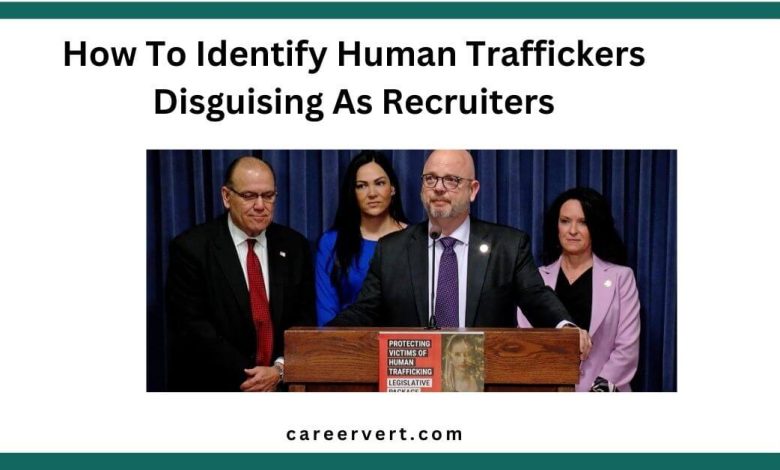How To Identify Human Traffickers Disguising As Recruiters

Despite the increase and report by Statista, committed efforts, and channeling of resources by governmental and non-governmental organizations, the number of individuals who fall victim to human trafficking continues to rise around the world, according to a recent report by Statista.
This trend is disquieting, as it appears that efforts to address the menace are ineffective. Human traffickers exploit individuals for a variety of reasons, with economic incentives being the most prevalent. This article will demonstrate how to identify human traffickers who are posing as recruiters, as well as provide additional information, statistics, and guidelines.
Who are Human Traffickers?
Human trafficking is defined by the United Nations Office on Drugs and Crime (unodc) as “the recruitment, transportation, transfer, harboring, or receipt of individuals through force, fraud, or deception, to exploit them for profit.” Human trafficking is not restricted by gender or age.
Human trafficking is a global offense that can manifest in any region. It has the potential to impact individuals of all ages and backgrounds, including men, women, and children. Human trafficking is perpetrated by individuals or organizations.
Trading human beings as commodities in exchange for money or unwholesome gains is the practice of human traffickers. Human trafficking victims are coerced into dehumanizing activities, including prostitution and robbery.
Check Also: Trusted overseas work permit consultants in Nigeria
Why Human Traffickers are Disguising as Recruiters?
We are currently residing in a global era. Now, more than ever, individuals are actively seeking employment opportunities abroad. This is particularly true for young people worldwide, as a significant number of them are either seeking international employment or an opportunity to migrate through their work.
It is not uncommon for individuals to become enthusiastic about any apparent favorable opportunity to work abroad, as a result of the increasing unemployment rates in developing countries. The activities of human traffickers who pose as recruiters are not always considered in this yearning for improved jobs.
The fraudsters exploit the ignorance and desperation of the public to entice a significant number of individuals into engaging in human trafficking. We trust that this article will assist all job seekers and young professionals in recognizing human traffickers who are concealing themselves as recruiters.
How to Identify Human Traffickers Disguising as Recruiters:
It is not sufficient to presume that you are too intelligent to be lured into the clutches of human traffickers; you must equip yourself with the appropriate information. Human trafficking is a reality that can affect anyone, particularly those who are seeking employment abroad. Several indicators warrant attention:
1. Unrealistic promises
Typically, if an offer appears to be too excellent to be true, it is untrue. Keep an eye out for unrealistic promises, including travel assistance, visa processing, a luxurious vehicle, accommodation, a clothing allowance, high remuneration, and other work benefits, all of which require minimal or no experience. I am aware that you are in pursuit of more favorable opportunities; however, you are certainly capable of identifying an illusory one.
These human traffickers, who were posing as recruiters, would typically provide only a phone number or email address for contact and minimal or no information about the position, despite the numerous benefits they had promised.
Previously, it was straightforward to identify them by conducting an online search for information about them. Although this remains a legitimate exercise, these perpetrators have enhanced their performance. Currently, a number of them are developing websites and posting resources online to create the illusion of authenticity. Avoid promises that are unverifiable and impractical.
2. Weak communication
You should anticipate a significant amount of information exchange when considering the possibility of working abroad. The recruiter should request a plethora of information from you to ascertain your qualifications for the position and other pertinent details.
You should also have inquiries about the job role, expectations, timelines, and other details that you need to clarify as a job seeker. If the purported recruiter is not providing any information or responding to your inquiries, it is advisable to exercise caution.
A genuine recruiter would necessitate a comprehensive understanding of your qualifications, work experience, status, availability to travel, and a plethora of additional information. If you are not receiving the appropriate inquiries or the communication flow is minimal or nonexistent, you may wish to consider leaving.
3. Shady contracts
It is imperative that you thoroughly review any contract that is presented to you. If you are uncertain about a clause, please seek clarification from the recruiter or other trustworthy and relevant sources. Search the internet for individuals’ responses to any inquiries you may have.
Run for your life if the contract appears to be overly vague and critical details are absent. Authentic overseas recruiters and companies are not so irresponsible as to recruit individuals without executing the appropriate contract. Conduct thorough investigation on the specifics of the contract and confirm them before considering adding your signature.
4. Absurd payment requirements
A common indicator that the job opportunity is not authentic is the requirement to pay money as a prerequisite for obtaining the position. If they are requesting payment for interviews, training, tools, or inventory, they are not a legitimate recruiter.
This is a straightforward method for identifying human traffickers who are posing as recruiters; they would demand payment in exchange for assistance. Many individuals have been misled into believing that the opportunity is authentic as a result of making such payments. Conversely, if the recruiter offers you a sign-on bonus or any other form of compensation, they are likely attempting to gain your confidence. Therefore, it is prudent to exercise caution.
How to Spot a Genuine Recruitment Agency/Recruiter:
To assist you in identifying a legitimate recruiter or recruitment agency, the following are a few suggestions:
1. Reputation
A recruitment agency that is legitimate would typically have a reputation that is both online and offline. Conduct a search for any pertinent information regarding the recruiter, including evaluations, comments, and feedback.
2. Successful placements
A recruitment agency or recruiter who is genuine should have a traceable history of effective placements. A testimony that portrays the recruiter in a favorable light should already exist. Have they conducted recruitment for any organization?
3. Competence
Authentic recruiters possess the necessary expertise to align the skills and experience of an applicant with the available job vacancies. Ideally, the position you are offered would align with your interests or aspirations.
4. Research
Genuine recruitment agencies are comparable to goldfish; they never conceal themselves. It should be effortless to locate and verify information regarding them.
5. Relevant registrations
An effective recruitment agency should be registered with the appropriate authorities.
Benefits of How To Identify Human Traffickers Disguising As Recruiters
- Exploitation Prevention: By identifying the indicators of trafficking, potential victims can circumvent circumstances that may result in exploitation. This awareness has the potential to prevent emotional and psychological trauma and save lives.
- Informed Decision-Making: By recognizing the characteristics of a legitimate recruiter versus a trafficker, individuals can make more informed decisions about job offers, thereby reducing the likelihood of falling victim to fraud.
- Community Awareness: By informing communities about the strategies employed by traffickers, they can become more vigilant and report any suspicious activities, thereby creating a secure environment for all.
- Support for Victims: The identification of trafficking can result in the provision of timely intervention and assistance to victims. Awareness can motivate individuals to seek assistance and offer them the necessary resources to escape hazardous circumstances.
- Better Tracking and Dismantling of Trafficking Networks: The ability to report suspicious activities to authorities can be facilitated by the knowledge of trafficking indicators, which can empower individuals and organizations to report suspicious activities.
- Enhanced Policies and Practices: Organizations may be motivated to establish more effective hiring practices and employee training programs as a result of increased awareness, which can assist in the identification and reporting of potential trafficking incidents.
- Protection of Vulnerable Populations: Certain groups, including refugees, migrants, and individuals seeking employment, are particularly susceptible. Protecting these populations from being targeted can be achieved by identifying traffickers.
- Enhanced Collaboration: The comprehension of trafficking tactics can enhance collaboration among law enforcement, social services, and NGOs, resulting in more effective responses to trafficking incidents.
- Empowerment Through Education: Teaching individuals about the characteristics and behaviors of traffickers enables them to trust their instincts and identify when something feels amiss, thereby improving their safety.
- Long-term Cultural Change: The development of a cultural shift that stigmatizes trafficking and exploitation can be facilitated by increasing awareness of human trafficking, thereby making it more difficult for traffickers to penetrate communities.
conclusion:
It is not incorrect to pursue more advantageous employment opportunities or to migrate through employment. Genuine recruitment agencies and opportunities to reside and work abroad are both present. For additional information regarding legitimate recruitment agencies in various regions, please consult our career advice page. By utilizing the advice provided in this article, you will be more adept at recognizing human traffickers who are posing as recruiters.
Frequently Asked Questions:
-
How can I identify human trafficking?
Inability to leave home or place of work; Inability to speak for oneself or share one’s information; information is provided by someone accompanying the individual; Loss of control of one’s identification documents (ID or passport);
-
What are the suspected actions of traffickers?
Traffickers employ a variety of control tactics; the most common include physical and emotional abuse and threats, isolation from friends and family, and economic abuse.
-
What are the indicators of human trafficking?
Someone may be experiencing labor trafficking or exploitation if they: Feel pressured by their employer to stay in a job or situation they want to leave. Owe money to an employer or recruiter or are not being paid what they were promised.



